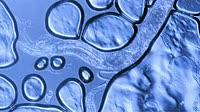Elaidic acid molecule rotating, animation. Elaidic acid is one of the common fatty acids found in hydrogenated vegetable oils, such as in margarine. Hydrogenation is an industrial process that partially saturates (adds more hydrogen to) fats. A side effect of this process is the formation of trans fats. Elaidic acid is a monounsaturated omega-9 trans fatty acid, meaning that it has one carbon-carbon double bond nine bonds from the end of the molecule, and that the carbon chains are attached to opposite sides of the double bond. Double bonds cannot rotate, so this gives the molecule a fixed linear shape. This causes it to pack more densely than would be the case if it were bent, as in the cis form, which increases the risk of the formation of plaques of atheroma, a major cause of heart disease. A diet rich in trans fatty acids causes blood levels of low-density lipoprotein (LDL), or 'bad cholesterol', to be higher than for a diet rich in cis fatty acids. See clip K003/7108 for the cis form of elaidic acid, the naturally occurring oleic acid.
Details
WebID:
C00724704
Clip Type:
RM
Super High Res Size:
1920X1080
Duration:
00:00:15.000
Format:
QuickTime
Bit Rate:
24 fps
Available:
download
Comp:
200X112 (0.00 M)
Model Release:
NO
Property Release
No













 Loading
Loading